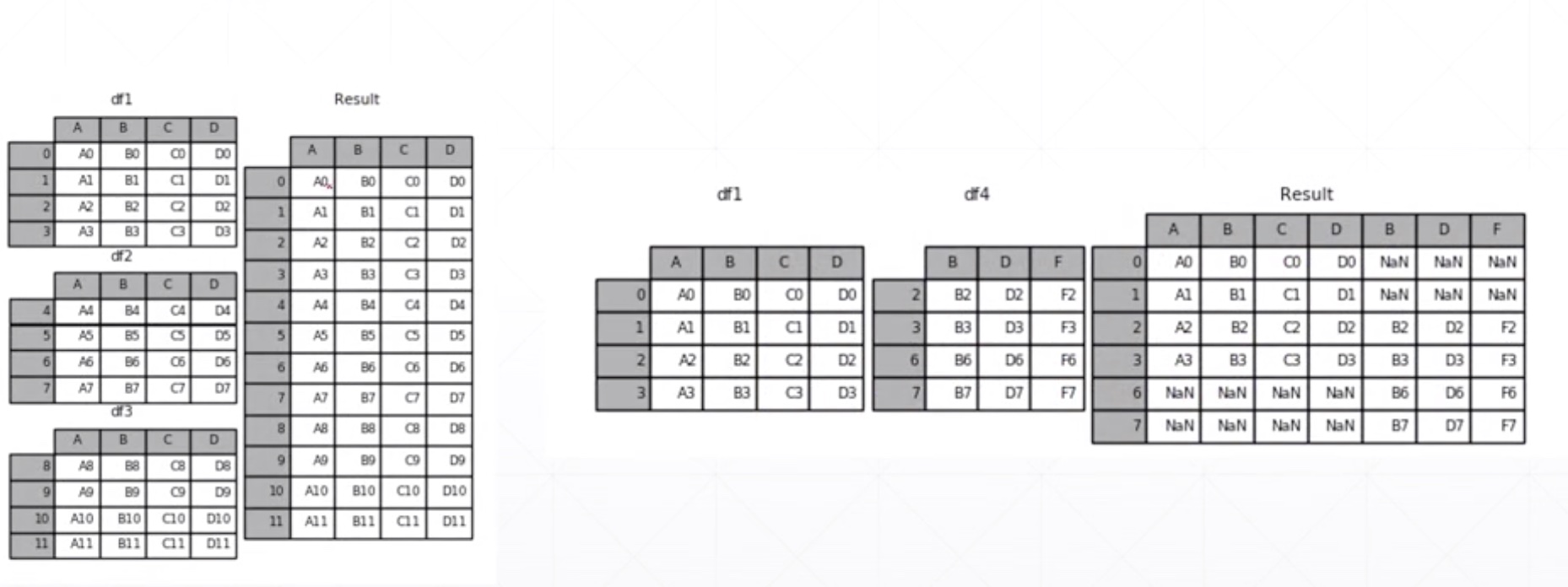合并与分割
TensorFlow2教程完整教程目录(更有python、go、pytorch、tensorflow、爬虫、人工智能教学等着你):https://www.cnblogs.com/nickchen121/p/10840284.html
Merge and split
- tf.concat
- tf.split
- tf.stack
- tf.unstack
concat
- Statistics ablout scores
[class1-4,students,scores]
[class5-6,students,scores]
import tensorflow as tf
# 6个班级的学生分数情况
a = tf.ones([4, 35, 8])
b = tf.ones([2, 35, 8])
c = tf.concat([a, b], axis=0)
c.shape
TensorShape([6, 35, 8])
# 3个学生学生补考
a = tf.ones([4, 32, 8])
b = tf.ones([4, 3, 8])
tf.concat([a, b], axis=1).shape
TensorShape([4, 35, 8])
Along distinct dim/axis

stack: create new dim
- Statistics about scores
School1:[classes,students,scores]
School2:[classes,students,scores]
[schools,calsses,students,scores]
a = tf.ones([4, 35, 8])
b = tf.ones([4, 35, 8])
a.shape
TensorShape([4, 35, 8])
b.shape
TensorShape([4, 35, 8])
tf.concat([a, b], axis=-1).shape
TensorShape([4, 35, 16])
tf.stack([a, b], axis=0).shape
TensorShape([2, 4, 35, 8])
tf.stack([a, b], axis=3).shape
TensorShape([4, 35, 8, 2])
Dim mismatch
a = tf.ones([4, 35, 8])
b = tf.ones([3, 33, 8])
try:
tf.concat([a, b], axis=0).shape
except Exception as e:
print(e)
ConcatOp : Dimensions of inputs should match: shape[0] = [4,35,8] vs. shape[1] = [3,33,8] [Op:ConcatV2] name: concat
# concat保证只有一个维度不相等
b = tf.ones([2, 35, 8])
c = tf.concat([a, b], axis=0)
c.shape
TensorShape([6, 35, 8])
# stack保证所有维度相等
try:
tf.stack([a, b], axis=0)
except Exception as e:
print(e)
Shapes of all inputs must match: values[0].shape = [4,35,8] != values[1].shape = [2,35,8] [Op:Pack] name: stack
Unstack
a.shape
TensorShape([4, 35, 8])
b = tf.ones([4, 35, 8])
c = tf.stack([a, b])
c.shape
TensorShape([2, 4, 35, 8])
aa, bb = tf.unstack(c, axis=0)
aa.shape, bb.shape
(TensorShape([4, 35, 8]), TensorShape([4, 35, 8]))
# [2,4,35,8]
res = tf.unstack(c, axis=3)
# 8个[2, 4, 35]的Tensor
res[0].shape, res[1].shape, res[7].shape
(TensorShape([2, 4, 35]), TensorShape([2, 4, 35]), TensorShape([2, 4, 35]))
# [2,4,35,8]
res = tf.unstack(c, axis=2)
# 35个[2, 4, 8]的Tensor
res[0].shape, res[1].shape, res[34].shape
(TensorShape([2, 4, 8]), TensorShape([2, 4, 8]), TensorShape([2, 4, 8]))
Split
- 相比较unstack灵活性更强
# 8个Tensor,全为1
res = tf.unstack(c, axis=3)
len(res)
8
# 2个Tensor,一个6、一个2
res = tf.split(c, axis=3, num_or_size_splits=2)
len(res)
2
res[0].shape
TensorShape([2, 4, 35, 4])
res = tf.split(c, axis=3, num_or_size_splits=[2, 2, 4])
res[0].shape, res[1].shape, res[2].shape
(TensorShape([2, 4, 35, 2]),
TensorShape([2, 4, 35, 2]),
TensorShape([2, 4, 35, 4]))

